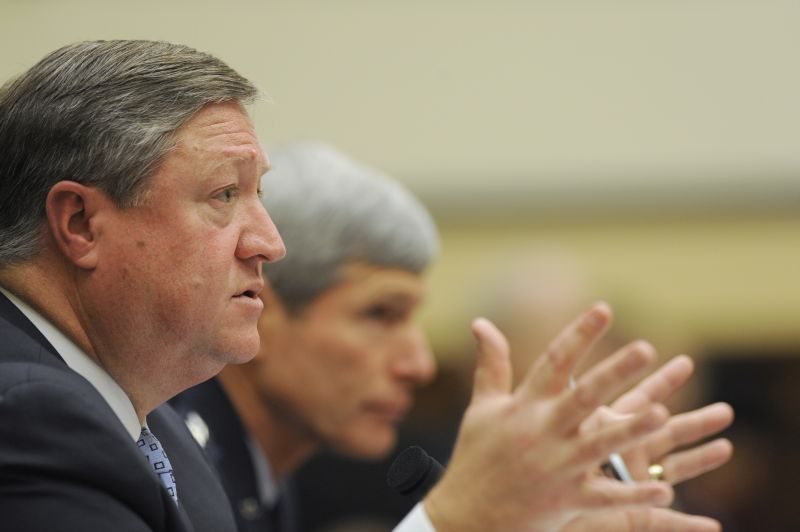Secretary of the Air Force Michael Donley and Air Force Chief of Staff Gen. Norton Schwartz discussed the Air Force fiscal-2012 budget request and recent developments in Japan and Libya during a Senate Armed Services Committee hearing here March 17.
The Air Force’s baseline budget request of $150 billion and $16 billion in overseas contingency operations supplemental appropriations represents a careful balance of resources among Air Force core functions necessary to implement the president’s national security strategy, Secretary Donley said.
“This budget request, fully appreciating the nation’s extraordinary fiscal condition, supports our Airmen in their continuing efforts to structure the force for maximum versatility across the spectrum of operations for today’s requirements and for future challenges,” General Schwartz added.
During the session, the Air Force’s top leaders said investment priorities will continue to minimize risk and maximize efficiency across the full spectrum of potential conflict.
“Proceeding with development and production of the KC-46 tanker aircraft; implementing the joint strike fighter restructuring; meeting the combatant commanders’ need for more intelligence, surveillance and reconnaissance; investing in the long-range strike family of systems, including a new penetrating bomber; and enhancing space control and situational awareness all remain critical capabilities for both today’s and tomorrow’s Air Force,” Secretary Donley said.
In addition to these investments, Air Force officials will continue to address challenges in readiness — in particular, the slow but persistent decline in materiel readiness most notable in the service’s non-deployed forces and the personnel challenges across 28 stressed officer and enlisted career fields, both of which are the result of today’s high operational tempo, he added.
“And of course, we’ll continue to support our active, Guard, Reserve and civilian Airmen, and their families, with quality housing, health care, schools and community support,” Secretary Donley said.
The secretary and general also noted the effect of the continuing resolution on the Air Force and its mission, as the operations tempo around the globe continues to intensify.
“Without a 2011 appropriations bill, we will have to further reduce flying hours, cancel training and exercise opportunities, delay or cancel weapon system sustainment and depot maintenance activities, and disrupt a multitude of other day-to-day operations,” General Schwartz said.
In the wake of Japan’s earthquake and its effect on that country’s nuclear reactors, Secretary Donley and General Schwartz said the service is bringing to bear all possible capabilities to support ongoing humanitarian assistance and disaster relief there.
“We are using C-17 (Globemaster IIIs) and other assets to help move search-and-rescue capabilities from the United States to Japan,” the secretary said. “We’ve used our helicopter and fixed-wing airlift capabilities to move food and water, equipment and key personnel around the main island in support of the local requirements, as defined by Japanese officials.”
Secretary Donley also stated that the Air Force will continue to work closely with U.S. Pacific Command to support the Department of State-authorized voluntary departure of family members and dependents of U.S. officials who wish to leave northeast Japan.
“To date, Airmen and their families are not at risk on our bases,” Secretary Donley said, adding that the service will continue to monitor potential health hazards to the 30,000 Air Force members and dependents in Japan.
The Senate panel also asked the service leaders about the current situation in Libya and the U.S. military’s ability to establish a no-fly zone over the country.
“It is clear that we could establish a no-fly zone if that was the mission that was assigned,” General Schwartz said, adding that the mission would undoubtedly require both United States- and Europe-based resources.
Prudent planning by the U.S. military is ongoing, Secretary Donley said.
“We are working to provide the civilian leadership with options, and ultimately, the president will decide what he wants us to do,” the secretary said.










